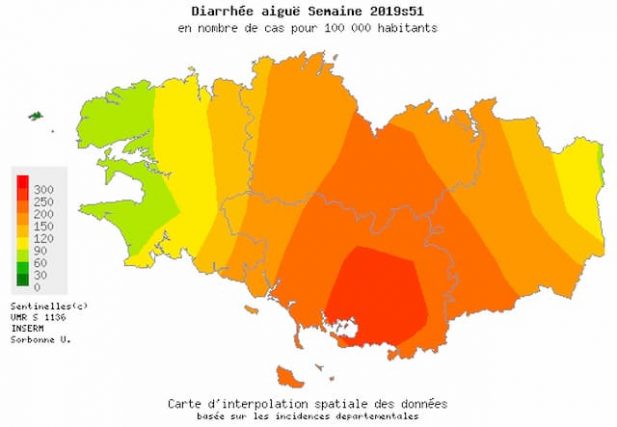In Brittany, Gastroenteritis Invites Itself During the Holidays

Have you spent Christmas with your head above a bowl? Don’t panic, it’s the return of the faithful gastro. In Brittany, the disease has been very active for several weeks.
While others were rejoicing at a busy party table, your stomach was yoyo and pains were twisting your stomach? Like many Britons at the moment, you have probably contracted the gastroenteritis virus. Most often benign, it makes many victims at the moment in Brittany. Explanations.
The gastroenteritis virus seems fickle this year. It goes from hand to hand or from mouth to mouth with ease and knocks out whoever catches it for a few days.
We all know the symptoms: vomiting and/or diarrhoea that makes your life so pleasant during this holiday season…
As confirmed on Twitter, ” Dr Pepper “, a general practitioner in Brittany:
Diarrhées, Vomissements, Diarrhées, Vomissements…
Vous pourriez pas varier un peu les patients, c’est monotone ce matin !
— 🤟 DrPepper (@DocPepperFR) 27 December 2019
Pain and diarrhea
Health Insurance explains that “acute gastroenteritis is an inflammation of the lining of the digestive tract responsible for diarrhoea and frequent abdominal pain and vomiting. It is most often viral and therefore very contagious. After an incubation period of 24 to 72 hours, gastroenteritis manifests as acute diarrhoea of sudden onset. There is then an increase in the frequency of bowel movements with more than three bowel movements in 24 hours, a change in their consistency, the bowel movements becoming soft or liquid. Diarrhoea can be accompanied by: nausea and / or vomiting, abdominal pain (cramps) and even moderate fever. ”
The Sentinelles network , which monitors the number of cases contracted per 100,000 inhabitants, noted 175 for the week of December 16 to 22, which is close to the national average of 177.
This number of cases is considered high by the Ministry of Public Health but it hides disparities. In Finistère, we are closer to 122 cases while the Morbihan recorded 228 cases, almost double, centralized around Vannes.
The Briochine and Lamballaise region, in Côtes-d’Armor, are also quite badly affected with nearly 200 cases, just like a large part of Morbihan and the south-east of Ille-et-Vilaine.
It’s only a beginning

This strong epidemic is, however, probably only just beginning. Because it is rather in January-February that gastroenteritis causes the most victims.
The Ministry of Public Health notably recorded large increases among young people under 20 and among the elderly. In France, the average age of patients is 25 years, and men represent 53% of cases.
In case of “classic” attack by the virus, you should not force yourself to eat but think of drinking to compensate for the loss of water evacuated in diarrhoea and vomiting and only water, preferably sugar or light vegetable broths, in small sips. Solid side, when we can eat, we must favour rice, potatoes, pasta, semolina, cooked vegetables like carrots, lean meats. All in small quantities and very salty.
Fiber is avoided so fruits and vegetables (except bananas and compotes), milk and dairy products and, above all, fat.
In two or three days, the symptoms disappear with the help, possibly, of medicines based on clay which can help with the relief. And if it lasts, it is better to consult a doctor or seek advice from a pharmacist.
Avoid transmission
To avoid contracting the virus, and hope to spend a good Christmas Eve of the 1st of the year, it is better to force yourself to a few basic hygiene rules not always respected as recently reminded by Health Insurance:
- Wash your hands often and ALWAYS before preparing meals, eating or after using the toilet.
- Do not store or exchange toothbrushes together.
- The towels should be changed regularly.
If you or someone in your family is sick, to avoid transmitting the virus, you must be extra vigilant … and clean up. Health Insurance advises people who have diarrhoea not to prepare meals and not to share their glass or cutlery.
You also have to be more meticulous and clean everything that is frequently touched by the infected person: doorknobs, telephone, toilets, sinks, etc. Not to mention the toilets which are better disinfected often.
Enjoyed this? Get the week’s top France stories
One email every Sunday. Unsubscribe anytime.


